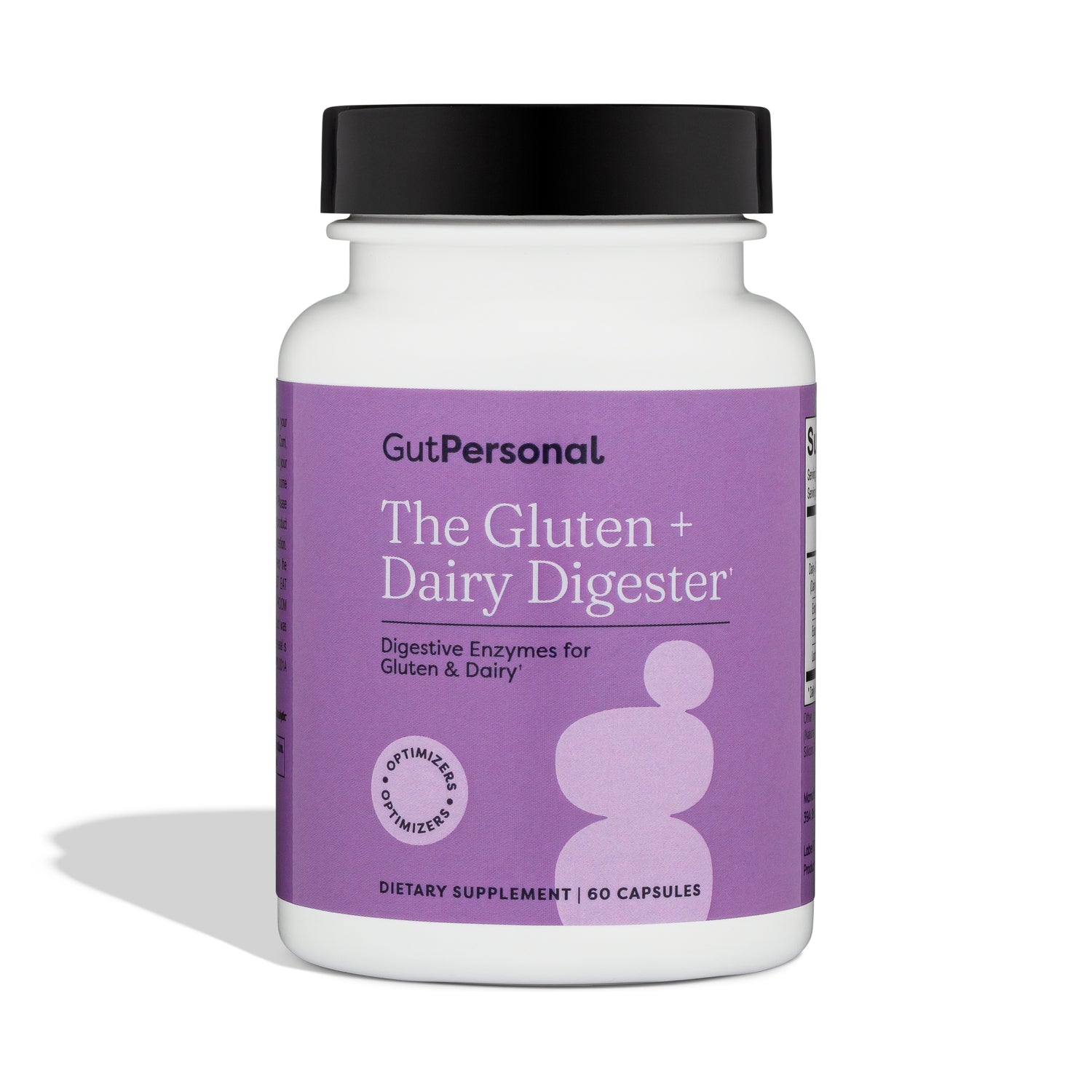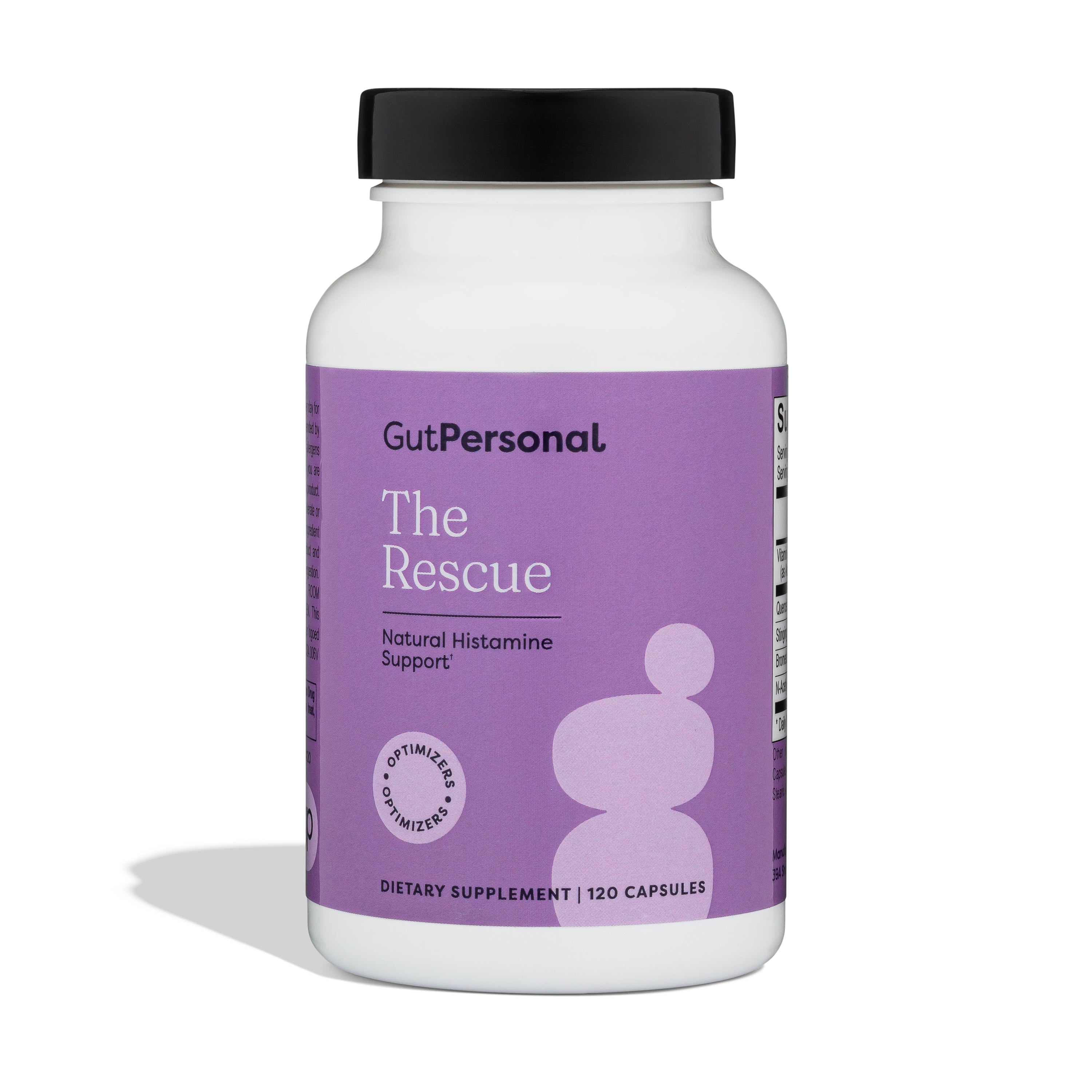The Gluten + Dairy Digester is a uniquely designed digestive enzyme targeted to help maintain healthy gluten and dairy digestion. The G&D Digester includes both endopeptidase and exopeptidase activity chosen for their ability to hydrolyze gluten proteins, as well as a unique mixture of protease enzymes and lactase to assist the digestion of multiple constituents of dairy products.
Overview
Food sensitivities are on the rise. They are often linked to gluten and dairy. Gluten consists of several different proteins found in wheat, barley, rye, and other grains. The two most prominent proteins found in gluten are gliadin and glutenin, which are difficult to digest due to their proline-rich peptides. Undigested gluten proteins may prompt the body’s immune system to attack its own tissues, resulting in varying levels of gluten sensitivity. Lactose is a carbohydrate found in dairy products. Lactase (also known as beta-galactosidase) is an enzyme required to break lactose down into simple sugars, which allows the body to easily digest and absorb them. Lactose malabsorption is a common condition in which the body does not express enough lactase enzyme to break down lactose, often, this triggers a heightened immune response or may cause gastrointestinal distress (e.g., gas or bloating) termed lactose intolerance. Casein and whey are protein components found in milk and dairy products. While casein is made up of many different proteins, whey is typically a mixture of beta-lactoglobulin and alpha-lactalbumin proteins. Individuals with these sensitives to gluten, lactose and dairy proteins are extremely limited in their food selection. Solutions are needed to provide flexibility in food choices for those sensitive to gluten and dairy. The unique enzyme blend in The G&D Digester is designed to break down gluten, lactose and dairy proteins to support the digestion of each food component for better absorption and maintenance of natural immune balance.
Endopeptidases and Exopeptidases Digest Gluten†
Breaking down gluten proteins with proteases may help alleviate the symptoms associated with gluten sensitivity. The unique combination of endopeptidases and exopeptidases present in The G&D Digester efficiently degrade both the internal and terminal peptides bonds of the gluten molecule. Specifically, enzymatic action creates the correct endopeptidase cleavage pattern near the long chain amino acids that need to be hydrolyzed by the exopeptidase, producing rapid degradation of gluten. The resultant smaller amino acids may be more easily absorbed by the body.
In vitro gel electrophoresis studies have demonstrated the ability of Glutalytic™ to break down gluten quickly and efficiently under physiological conditions of the body. Specifically, an in vitro test has shown the capability of Glutalytic™ to degrade gliadin (the major immune-stimulating protein in gluten) into very small quantities in the time it takes to reach the small intestine (i.e., 90 minutes). In another in vitro study, compared to other gluten digestive supplements, Glutalytic™ was able to digest all but 4% of the gluten in a 90-minute window.3 Glutalytic™ was later shown to have the capability to hydrolyze the majority of gluten proteins found in common foods over a similar time course. Other studies have demonstrated the ability of endopeptidases to hydrolyze gluten and reduce gluten’s immunogenic peptides.
Gluten-digesting enzymes have the reported ability to effectively reduce the frequency and severity of symptoms associated with non-celiac gluten sensitivity, as well as reduce levels of IgA to maintain normal immune balance.6-8 For example, after consuming a Glutalytic™ product with each meal for 30 days, the Glutalytic™ group showed a significant reduction in GI symptom scores and reduced deamidated gliadin IgA antibody levels. Additionally, after one week of using Glutalytic™, subjects reported decreased symptoms commonly associated with gluten consumption including pain in the upper abdomen, feeling bloated, trouble emptying bowels, and food cravings. These studies suggest that the administration of gluten-digesting enzymes may be helpful in significantly breaking down gluten proteins in humans. This is especially important for those who have sensitivities to the immunogenic proteins in gluten.
Lactase Breaks Down Lactose†
Gel electrophoresis testing in vitro has demonstrated the ability of the enzyme blend in Dairylytic™ to break down the lactose present in dairy quickly and efficiently over a 90-minute time-period under physiological conditions, with the most rapid degradation of lactose occurring within 30 minutes of enzymatic exposure. Human lactose tolerance challenge studies have evaluated lactase’s ability, when given orally as an exogenous enzyme, to degrade varying lactose loads as measured via hydrogen breath test and through subjective gastrointestinal symptom inventories. One randomized, double-blind, placebo-controlled human clinical trial found benefit for supplementation with varying lactase preparations when given before a 20g lactose challenge.10 A significant improvement in breath hydrogen levels and severity of gastrointestinal symptoms for lactase enzyme preparations was found compared to placebo. In humans, digestive symptoms due to lactose malabsorption are often difficult to distinguish from maldigestion/intolerance to other food components (including other dairy proteins such as casein). Thus exogenous lactase supplementation alone may not lead to symptom improvement in all individuals, as is reflected in the large inter-individual variation seen in the lactase supplementation studies. For this reason, Dairylytic™ combines lactase with other proteases that hydrolyze other dairy proteins, including casein and whey.
Proteases Hydrolyze Dairy Proteins Including Casein and Whey Proteins
Protease enzymes support dairy protein digestion and absorption. Specifically, these enzymes hydrolyze milk proteins into smaller peptides that may be better absorbed by the body and less likely to bind to antibodies and illicit an immune response in sensitive individuals.11 The body’s lack of a sufficient amount of a protease enzyme required for protein digestion may cause gastrointestinal distress and may lead to protein sensitivities, where the body’s immune system recognizes the dairy protein as a foreign substance and may launch a defensive response against it.
Human studies have investigated the role of enzymes in breaking down whey protein, and have reported increased amino acids in the blood after the consumption of enzymes concomitantly with whey protein. The enzymes in the Dairylytic™ blend have been shown to facilitate overall protein hydrolysis in dairy (i.e., milk protein concentrate and milk protein isolate solutions) under physiological conditions of the human body.11 In vitro analysis demonstrated the Dairylytic™ enzyme blend hydrolyzed casein into very small peptides within 30 minutes and achieved complete hydrolysis within 90 minutes. The same in vitro analysis found the enzymes contained in Dairylytic™ were able to hydrolyze whey protein starting within 15 minutes and led to complete hydrolysis after 90 minutes.
Suggested Use
1 capsule before each meal
Buy The Gluten + Dairy Digester here!







Leave a comment
All comments are moderated before being published.
This site is protected by hCaptcha and the hCaptcha Privacy Policy and Terms of Service apply.